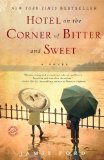Summary | Excerpt | Reading Guide | Reviews | Beyond the Book | Read-Alikes | Genres & Themes | Author Bio

A Novel
by Jamie FordThis article relates to Hotel on the Corner of Bitter and Sweet
Japanese-Americans in World War II
People of Japanese descent were the victims of racial prejudice from the time
they first started to arrive in the USA, and USA-controlled Hawaii, in the mid
to late 19th century to work as laborers. By the early 1900s, some
Japanese immigrants had started to lease land and sharecrop - California reacted
by passing The Alien Land Law of 1913 which banned the purchase of land by
Japanese. A little over a decade later, the 1924 US Immigration Act banned
immigration from Japan.
By the start of World War II, anti-Japanese sentiment was high, particularly
among the farming and fishing communities competing with the Japanese for both
jobs and commerce. The panic and hysteria following Pearl Harbor in 1941
increased the public's overall distrust of their Japanese neighbors.
center>
On February 19, 1942, Franklin D. Roosevelt signed
Executive Order 9066. The document permitted the Secretary of War and the
U.S. armed forces commanders to define any area of the country as a military
zone "from which any or all persons may be excluded." The order was soon used
against those with "Foreign Enemy Ancestry" (Japanese, Italians and Germans).
General John L. DeWitt issued a proclamation on March 2, 1942 declaring the
entire Pacific coast up to 100 miles inland as an exclusion zone, and later, on
May 3, DeWitt issued Civilian Exclusion Order No. 346, ordering all people of
Japanese ancestry to report to assembly centers, from which they would be sent
to "relocation centers." The order applied to anyone with as little as 1/16th
Japanese heritage, citizens and non-citizens, even orphaned infants.
 Ultimately over 110,000 people of Japanese descent were displaced; more then
two-thirds were U.S citizens, and approximately half were children. Families
were often given as little as 48 hours to evacuate their homes, and were allowed
to take only what they could carry. In some cases they left items in safe
locations, such as the basement of the
Panama
Hotel in Seattle. Others attempted to sell what they could; many possessions
had to be simply abandoned.
Ultimately over 110,000 people of Japanese descent were displaced; more then
two-thirds were U.S citizens, and approximately half were children. Families
were often given as little as 48 hours to evacuate their homes, and were allowed
to take only what they could carry. In some cases they left items in safe
locations, such as the basement of the
Panama
Hotel in Seattle. Others attempted to sell what they could; many possessions
had to be simply abandoned.
Ten
internment camps were hastily constructed (by the internees themselves),
generally in deserts and other uninhabited parts of the West. The camps were
overcrowded and conditions were poor. There were no plumbing, hot water or
cooking facilities, and almost no heat. The residents lived in drafty barracks
constructed of wood frames covered with tarpaper. During the summer months,
temperatures reached 110°F degrees at some camps, while in the winter, others were as cold as -30°F.
The internees were responsible for setting up their own schools, places of
worship and medical care (which was minimal). Leadership positions were giving
to Nisei (American-born Japanese), slighting the Issei (the older generation,
born in Japan). This added a layer of stress to the environment in the camps, as
it was contrary to Japanese culture in which elders receive the more honored
positions in society.
Two legal challenges were filed - Hirabayashi v. United States
(1943), and Korematsu v. United States (1944), maintaining that
the internments violated the citizens' fifth-amendment rights, but the Supreme
Court ruled against the plaintiffs in both cases.
Franklin D. Roosevelt rescinded Executive Order 9066 in 1944, and the last camp
was closed by the end of 1945. Those who had been incarcerated usually found
that they'd lost everything. In the majority of cases, any property left
behind had been appropriated by others. The U.S. Government did permit those who
suffered relocation to claim reparations, but it was common for both tax records
and any proofs of ownership to have been destroyed, so very few were compensated
for their losses.
The McCarran-Walter Act of 1952 removed many of the racial barriers to
citizenship. In 1959 Daniel K Inouye became the first Japanese American in
Congress.
Interesting Link:
The website of the
Minidoka
Internment Camp, Idaho, now a national monument.
![]() This "beyond the book article" relates to Hotel on the Corner of Bitter and Sweet. It originally ran in February 2009 and has been updated for the
October 2009 paperback edition.
Go to magazine.
This "beyond the book article" relates to Hotel on the Corner of Bitter and Sweet. It originally ran in February 2009 and has been updated for the
October 2009 paperback edition.
Go to magazine.
Your guide toexceptional books
BookBrowse seeks out and recommends the best in contemporary fiction and nonfiction—books that not only engage and entertain but also deepen our understanding of ourselves and the world around us.